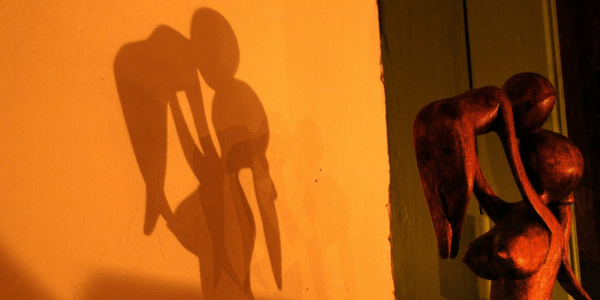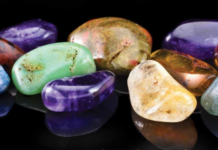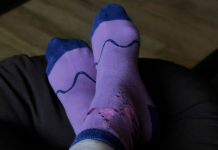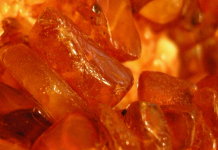
The cycle turns, from mother to daughter and back again. Birth and rebirth colour the tides of time, like leaves budded and shed with the seasons. We can’t see into the continuity of this spiraling path with our eyes, and so we believe that this revolution is an amalgam, a whole unto itself. In time, mother becomes Goddess just as father is God. Even when we have grown beyond these childish ideas, there is a resonance to this belief that we hold in our deepest selves that permeates and shapes our lives.
The problem with having mortal gods is that as mortals, we remain deeply divided from ourselves. We cannot hold to the perfection of a being that is conceived in dreams, and who embodies and fulfills our deepest needs and desires. Our mothers cannot shoulder the burden of this need for us. Their bones are too brittle, their eyesight too bleary. They strive for us but their victories cannot vanquish death. Though they seek to raise us beyond themselves, they cannot shepherd us past the gateway to the places where the divine resides.
My mother has struggled with a lifetime of mental illness. The first time she had a breakdown, I was in third grade. She went away for several weeks and our house became infested with cobwebs, darker and more foreboding than when she lived in it. After the first time she went away, nothing was ever the same.
I remember having a very lonely childhood. I was parentified, taking up the banner of motherhood for my own mother. She would share her struggles with me: everything from finances and trouble paying the mortgage, to relationship issues between my parents. Because of this, I strove to be wise beyond my years, so that I could help shoulder the burdens that were slowly pushing her underwater. She was constantly floundering. She was not — could not — be my ground or my support. I felt very much that I needed to be hers.
As I grow older, slowly creeping into the age when I myself might take up the torch of motherhood, I begin to wonder about how my early notions of my mother affect my adult self, my vision of myself as a caretaker, and my custodianship of myself as a woman. My interior vision of the mother is one of instability, of grief and of darkness. Perhaps this is why I have chosen Hecate as my personal goddess. My mother has always been a shrouded figure, one who remains infinitely beyond me.

As I progress on my chosen path, I begin to contemplate my relationship with the Goddess. Who is She to me? I have had trouble connecting with goddess energy, particularly because I was raised Roman Catholic and was taught to view deity through the masculine archetype. Yet, I wonder if part of my trouble could stem from my relationship with my mother. I have always been afraid of being consumed by my mother, of being swallowed up in her sickness. I have always secretly walled a part of myself off from her, and from the world, in order to preserve that piece of my soul. No matter what she would ask of me, I would never give over that piece of myself.
When it comes to the Goddess, in my meditation and in my worship, I do not want to reserve myself from Her vision. I want Her to see into every crevice of my being and to take me, whole and unadulterated. I want to be seen and to be comprehended as I am. I also want to reform what the mother is within my psyche. I want to revitalize the notion of motherhood and what it means to be a mother. I want to rewrite the archetype and to one day attempt to fill this newfound place with my own presence, to offer a sacred home for my own children to abide within. I want to be able to establish this image in both my worship and as a means of inspiration, as something to strive towards, not be imprisoned within.
Carl Jung, famous psychotherapist and protege of Sigmund Freud, believed that we create archetypes of our parents, and that these archetypes go on to play roles in our adult relationships to both others and to ourselves.1 Jung believed that these imperfect archetypes created by the child are projected onto the parent and form the basis of adult striving, either to fulfill or negate these perceptions. My own mother-myth created a mother that needed to be cared for and fed. In the negation of her own needs and desires, as well as the repression of her own childhood trauma, my mother attempted to resist her own sickness, therefore creating the ground for the cycle’s continuance. In rejecting herself, she rejected her own healing, passing down a history of trauma through our bloodline.
In my own attempts at healing, I have looked at my perception of my mother. The image that I have in my head will never be who she really is. I had needs that she was never able to and will never be able to fulfill, and my role as an adult woman is to accept her shortcomings. I need to begin this process of healing and feeding my soul myself. I must feed myself in those places where my mother could not feed me, and heal myself in ways that she could not heal herself.

My quest for the Goddess has been a perfect framework for this healing. She can be the perfect mother, a contradiction, and a mystery, yet whole and abundant and total. She can be a refuge, her spirit can be everywhere, forever comforting and guiding me. She is the expression of all that is, everything cruel and kind, every yearning within me and yet none of this. She is both the void and the whole and yet none of these. She has many faces, as many faces as I may need. She is the expression of my ideal self, a mirror of my selfhood, and yet much more vast than anything I can imagine.
Pursuing my relationship with the Goddess allows my mother to become more human. She no longer needs to stand in the place of the divine. She can become merely one unique expression of Her wholeness. My mother does not need to be a harbour of peace for me, because the Goddess is helping me to create that harbour within myself. My mother is a person, the woman who gave birth to me. As her mythic qualities fade, she becomes more vibrant to me. Her flaws make me love her more, make me more sympathetic to her struggles.
Because I have begun to fulfill my own needs, I have less resentment for her failure to do so. My mother taught me how to be a woman and a mother, but my role as an adult, and as a mother in my own right, makes me able to craft the archetype of the mother, and to take up my own unique expression of womanhood. My passage into womanhood is what makes me responsible for myself, for my choices, for my healing, for my gift to the world. If and perhaps when I have my own children, I want to take up my role as the mother consciously, to give to them more of myself, to witness without judgement. I want to feed myself so much that I run over like a fountain of life. I want to develop a positive relationship with the feminine within myself, to help the daughters of the world to heal.
Everyone is capable of taking upon themselves the stories of their own parents. You can create the perfect parent in your mind and in this process, you can begin to walk the path that you set before yourself. You can have conversations with your parental archetype, imagine them in your memories interceding where others failed you. You can re-imagine a history of love. You can replace voices in your head that may be clouded with darkness. It is only a matter of stepping into the role of the author, the role of the creator. It is in investigating and invigorating the role of the mother, that we can embrace our position as creators.

To ascend into the role of an adult and therefore a creator of stories, we need to accept our parents’ mortality. We need to allow them their imperfections and decouple their stories from the archetypes of the mother and the father. Those archetypes, nebulous and permeable, are subject to our magickal work and our imaginings. If we choose to spend conscious energy contemplating their reality, we can expand our notions of our parental archetypes to surpass the human examples that we are shown, and therefore connect with a greater and more divine source of parental energy. We can begin to open ourselves to the ideal that is possible in an archetype, one that is not subject to the material realm or its limitations. As our ideals become imbued with divine light, they become closer to the reality of the gods.
Our parents can never be gods in their own right, but they take the noble duty of standing in for us as we grow until the time when we reach beyond their guidance. My adult self has grown beyond the limitations of my own mother and father. I am now ready to focus my sights on the Goddess and the God, the divine masculine and feminine, and ultimately the reality which is beyond all duality. I work with my archetypes in my meditation, opening up a conversation that will allow for my personal healing and the healing of my ancestors. I can choose to see what could have been rather than what was, to connect to what was needed rather than what was lost. There is a world that is accessible to me, where the ideal exists. It is in working with the archetypes that I can begin to connect to the part of myself that is also whole, ideal, and divine.
Image credits: Alessandro Capotondi, Juraj Patekar, wim hoppenbrouwers, anjan58
- silke, “On Mother Archetype and Mother Complex by C G Jung,” the16types.info, 6 October 2011 [↩]








